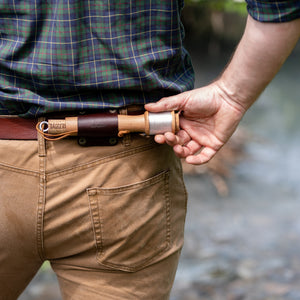Couch-2-Campsite #4 Better Living Through Knots

Jessica Vozel
New to the outdoors. Not new to writing.
So far in the Couch to Campsite series, we've covered why you should get out there (and why now is the best time), learned to build a campfire, and boiled water for cooking and purifying.
Now let’s talk about another essential outdoor skill: tying knots.
Boy Scouts, move along; this post is for those of us who never learned how to tie knots in anything but our shoelaces. (There are many of us out there.)
Here, I'll outline five of the best knots to know for camping, backpacking and bushcraft. With these knots you can put up your camping shelter, tie and drag heavier items like logs, string up a clothesline, hoist your food supply away from hungry critters for the night... and more.
Tip: when just starting out, a thicker rope is easier to see and handle. Grab two six-foot lengths of nylon rope from Home Depot or similar. Then, once you’ve gotten comfortable, take off the training wheels and get yourself some 550 paracord (i.e. real paracord with a tensile rating of 550 pounds) for use in the outdoors.
As an outdoor beginner, knots remind me of algebra. Confusing. Fickle. Known to cause a few frustrated tears as I confront my own limitations. And—eventually, when something clicked and I finally started to get on a roll—not so bad. Even fun.
So, onto the knots.
How to Tie the Sheet Bend Knot
The sheet bend knot comes in handy when you need to securely join two ropes/cords for more length. Say, for example, you find a good spot to set up your camp, but the trees you want to use for your tarp shelter are too far apart. Sheet bend to the rescue.
How to Tie a Taut-Line Hitch Knot

My first taut-line hitch, which I used to set up my tarp shelter.
How to Tie a Figure 8 on a Bight
The figure 8 on a bight and the bowline simply let you create a loop out of your rope or cord. This type of knot is foundational for the prusik knot, which we’ll cover next.
Here’s the instruction for creating a figure 8 on a bight:
How to Tie a Bowline Knot
How to Tie a Prusik Knot

Secure your tarp shelter to the ridgeline using prusik knots.
With a prusik, you can flexibly secure your tarp to the ridgeline. Like the taut-line hitch, a prusik makes life easier by leaving a bit of margin of error. Move your tarp to-and-fro on the ridgeline as needed, then pull the prusik taut to anchor it in place.
There you have it—the five basic knots you need to know for camping. They just may save your life (or at the very least, makes your life easier). Remember: practice makes perfect. It took me a couple dozen attempts before the physics of knots finally started to come into focus. Now I’m starting to be able to speak their language.
So let’s put that fluency to good use. Next up on Couch to Campsite, I’ll use these knot-tying basics to construct a camping shelter using a tarp. Stay tuned!
Find calm and confidence.
No matter where you are in your journey to reconnect with the wilderness, Daggerfish has the minimalist, intuitive gear & tools to help you get closer.




















